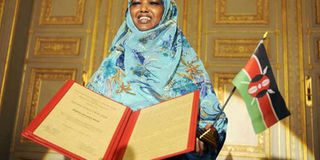Premium
Women’s security vital for development

The late Ms Dekha Ibrahim Abdi, a peace activist, poses after being awarded the 2009 Hesse Peace Prize on January 21, 2010 in Wiesbaden, Germany. In 1992, Ms Abdi and other women, started a grassroots peace initiative drawing inspiration from the traditional dispute resolution. PHOTO | AFP
What you need to know:
Wajir is an interesting example of women’s involvement in the quest for peace.
- In 1992, Dekha Ibrahim and other women, started a grassroots peace initiative that drew inspiration from the traditional dispute resolution mechanisms.
That initiative, Wajir Peace and Development Committee, was the genesis of the district peace committees that have been replicated in the country.
The Wajir experience has been showcased globally as a best practice when it comes to community-led peace initiatives.
When we decided to visit Wajir earlier this month, we did so because the women of this county have shown the entire world how the cause of gender equality can be advanced even in very harsh circumstances. However, major challenges still remain.
The year 2015 was crucial for the enhancement of the women, peace and security agenda, marking the 15th anniversary of United Nations Security Council Resolution (UNSCR) 1325, which acknowledges the inordinate impact of war on women.
It also emphasises women as proactive agents for transformative change and sustainable peace and demonstrates why their role in conflict management and resolution and peace-building has to be secured.
The Security Council presented growing evidence that women’s empowerment is fundamental to the achievement of sustainable peace.
Ultimately, it is about accelerating economic recovery, strengthening peace support operations, improving humanitarian assistance, and preventing and countering violent extremism.
LITTLE CHANGE
Sadly, in many countries, alarmingly little has changed on the ground in terms of women’s engagement in peace talks, protection from sexual and gender violence during and after conflict, or engagement in relief and recovery.
Wajir is an interesting example of women’s involvement in the quest for peace.
In 1992, Dekha Ibrahim and other women, as well as concerned men started a grassroots peace initiative, drawing inspiration from the traditional dispute resolution mechanisms.
This group became the Wajir Peace and Development Committee that brought together traditional leaders, government security officers, parliamentarians, civil servants, Muslim and Christian religious leaders, as well as civil society organisations.
It was the genesis of the district peace committees that have been replicated in the country.
The Wajir experience has been showcased globally as a best practice when it comes to community-led peace initiatives.
WOMEN'S MARGINALISATION
Nevertheless, it has been argued that the women of Wajir are marginalised when it comes to decision-making.
What is more, the population of Wajir is still experiencing different kinds of security threats and women and girls suffer disproportionately from the consequences of conflict.
Apart from inter-clan conflict and the terrorist threat, for many women, the quest for peace starts in the home.
According to the Kenya National Demographic Health Survey 2014, 40 per cent of married women (compared to 10 per cent of married men) have experienced physical and/or sexual violence.
A society where women are threatened, raped, defiled, and killed by family members is not at peace.
Wajir uses alternative dispute resolution (maslaha) as a legal way of settling disputes, including cases of sexual and gender violence.
However, women are now questioning whether this avenue can truly bring justice to the female victims.
They are concerned that an ad hoc justice system that excludes women from decision-making risks accentuating their vulnerability and ultimately contributes to further victimisation.
The Wajir county government has established the county peace directorate.
Coupled with the work of the district peace committees and civil society organisations, this initiative lays the foundation for a constructive peace architecture.
However, the successful involvement of women is crucial for an inclusive and a sustainable outcome.
At the national level, UNSCR 1325 is operationalised through the Kenya National Action Plan, whose theme is “Kuhusisha wanawake ni kudumisha amani” (to involve women is to sustain peace).
The action plan recognises that the inclusion of women and gender perspectives in decision-making strengthens the prospects for achieving sustainable peace.
The future of Kenya depends on its success in ensuring an equal society. Sustainable development is not possible if half of the population is excluded from real political influence.
Mr Borgstam is the ambassador of Sweden to Kenya. Mrs Kavuma is the country director, UN Women Kenya.






